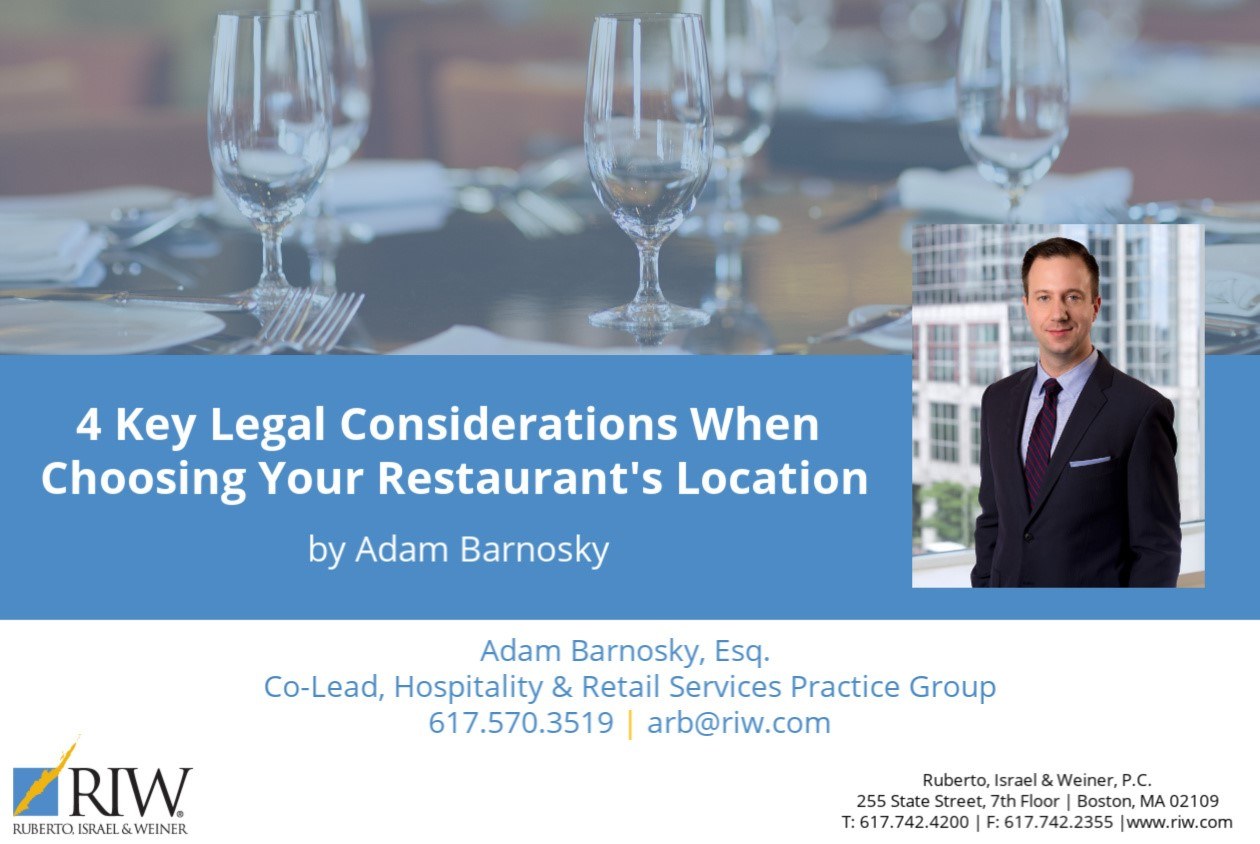4 Key Legal Considerations When Choosing Your Restaurant’s Location

© Getty Images
Starting a new restaurant requires months, if not years, of planning. From concept to financing, location scouting to staffing, the number of tasks is countless, and the hurdles never-ending. The most difficult issues arise not from the things you expect, but from the unknown and unanticipated like asbestos discovered during renovations or the obscure permitting hang-up that delays your opening. Here are a few important things to consider when choosing your restaurant’s location.
Zoning Review
Every town and city has its own local rules dictating where certain businesses can be located. Step one in location scouting should always be checking the potential site’s underlying zoning. How late can the restaurant be open? Is live music allowed? What are the parking requirements? Is restaurant use even allowed? Zoning answers all of these questions, and regulates their use and potential for renovations, expansions, etc. Don’t think that another restaurant nearby means your location is properly zoned. The other restaurant may be located in a different zoning district, or has obtained special relief from zoning.
Quick Tip: Most communities post zoning maps and codes online, which are good for an initial review (however, be wary of outdated maps and overlay districts).

© Getty Images
Liquor License Availability
Liquor licensing is a nuanced mechanism in Massachusetts, and even more so in the City of Boston. There are numerous issues surrounding municipal quotas, ownership and citizenship requirements, cross-ownership restrictions, and a variety of other local and state rules that will govern your ability to obtain a liquor license. In Boston, a full liquor license can cost up to $500,000 (a number that is continually rising), while the same license in Cambridge can be obtained for a comparably nominal fee (under certain circumstances). Similar to zoning, make sure to review the city or town‘s licensing structure and availability during site selection prior to signing a lease agreement.
Quick Tip: Start by contacting the licensing administrator for each municipality, who will have invaluable insight on process, scheduling, and local nuances and rules.
Community Outreach & Neighborhood Concerns
Developing a restaurant without an ear for the neighborhood can be a recipe for failure. Early in the planning stage you should get to know the local business associations, neighborhood groups, and nearby condominium associations. From trash storage to vehicle deliveries to parking issues, each organization will have different concerns, needs, and requests. These groups, along with district city councilors and other local stakeholders, can be integral to shepherding your project through the necessary boards and commissions.
Quick Tip: If you are unfamiliar with the community, start with a call to the economic development department for a list of community organizations.

© Getty Images
Letters of Intent & Permitting Contingencies
Avoid the mistake of assuming a letter of intent is just a formality before negotiating the actual lease agreement. While it is true that a lease will contain dozens of additional legal provisions, the letter of intent will serve as the basis for every important business term in your lease, and set the table for the negotiation and relationship moving forward. Carving out generous time for due diligence is critical to ensuring the location is right for you.
Quick Tip: Make sure your LOI has tenant-friendly termination rights in the event you are unable to obtain comprehensive permitting, including food permits, liquor licensing, seating, parking, zoning, and entertainment.
Adam Barnosky is an attorney and co-lead of RIW’s Hospitality & Retail Services Practice Group. Adam represents chefs, restaurateurs, hoteliers, brewers, and entertainment facility operators in Boston and throughout Massachusetts. He can be reached at arb@riw.com or 617.570.3519 and on Twitter @adambarnosky.
